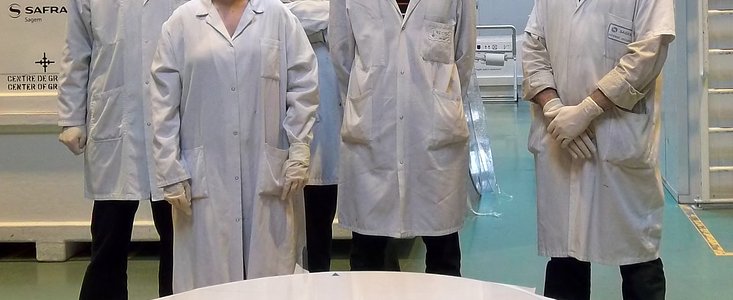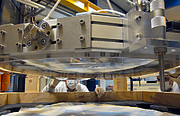Annuncio
Uno specchio super sottile per immagini stellari più nitide
Consegnato un nuovo componente delle ottiche adattive per il VLT dell’ESO
02 Marzo 2012
La società francese SAGEM ha consegnato un specchio a guscio straordinariamente sottile per il VLT dell’ESO. Lo specchio ha un diametro pari a 1120 millimetri, ma è spesso soltanto 2 millimetri, cosa che lo rende molto più sottile della maggior parte dei vetri utilizzati per le finestre. Questo specchio deve essere abbastanza sottile da agire quasi come una membrana flessibile. Quando sarà installato sul telescopio, la forma della sua superficie riflettente verrà modificata di continuo, in maniera lieve, per correggere gli effetti di sfocatura dell’atmosfera terrestre e produrre immagini molto più nitide.
Lo specchio a guscio sottile è composto da una lastra di materiale ceramico che è stata levigata fino a ottenere una forma molto precisa. Il processo di produzione ha avuto inizio con un blocco di ceramica Zerodur, fornito da Schott Glass (Germania), con uno spessore pari a più di 70 millimetri. La maggior parte di questo materiale viene eliminata con la levigatura per creare il sottile guscio finale. La sfida consiste nell'esercitare pochissima pressione e bassi livelli di tensione sul vetro durante il processo di produzione.
Produrre e testare uno specchio così ampio e flessibile è una sfida enorme, ma SAGEM è riuscita a superarla, controllando attentamente i rischi del processo di produzione, e ha consegnato uno specchio sottile in linea con i requisiti dell’ESO.
Il nuovo specchio è un componente di primaria importanza dello specchio secondario deformabile che sostituirà l’attuale specchio secondario di uno dei Quattro UT del VLT. Lo specchio farà parte della nuova Adaptive Optics Facility per il VLT. L'intero specchio secondario è costruito intorno a un “sistema di riferimento” rigido (ann1056) e comprende un insieme di 1170 attuatori che applicano una forza sui 1170 magneti incollati nel lato posteriore dello specchio sottile. La forma della superficie riflettente dello specchio a guscio verrà deformata fino a mille volte al secondo grazie all’azione di questi attuatori, al fine di correggere gli effetti di turbolenza nell’atmosfera terrestre e fornire immagini migliori e molto più nitide.
L’Adaptive Optics Facility utilizzerà anche la tecnologia a stelle guida laser, che viene sviluppata in parallelo (ann12012).
Dal 2004, l’ESO, con l’aiuto della Commissione Europea, ha finanziato gli sforzi per lo sviluppo del know-how in merito alla produzione di specchi a guscio sottile in Europa. L’ESO è lieto che questi sforzi stiano dando i loro frutti, grazie alla competenza e alla determinazione di SAGEM.
Il nuovo specchio a guscio sottile, e il sistema di ottiche adattive del quale fa parte, sta preparando la strada al prossimo progetto dell’ESO: l’E-ELT (European Extremely Large Telescope). Questo lavoro sta dando un impulso a tecnologie avanzate come gli specchi deformabili con un ampio numero di attuatori e alla produzione di specchi a guscio sottile. Queste tecnologie sono applicabili direttamente al futuro telescopio gigante da 40 metri e il design dell’E-ELT comprende già uno specchio deformabile a guscio da 2,4 metri, ampiamente ispirato allo specchio deformabile dell’Adaptive Optics Facility.
Links
- Il Dipartimento per le Ottiche Adattive all’ESO
- Opuscolo sull'AOF (Adaptive Optics Facility) all'ESO (file PDF)
Contatti
Robin Arsenault
ESO, Germany
Tel: +49 89 3200 6524
Email: rarsenau@eso.org
Richard Hook
ESO, La Silla, Paranal and E-ELT Press Officer
Garching bei München, Germany
Tel: +49 89 3200 6655
Email: rhook@eso.org
Riguardo all'annuncio
| Identificazione: | ann12015 |
Our use of Cookies
We use cookies that are essential for accessing our websites and using our services. We also use cookies to analyse, measure and improve our websites’ performance, to enable content sharing via social media and to display media content hosted on third-party platforms.
ESO Cookies Policy
The European Organisation for Astronomical Research in the Southern Hemisphere (ESO) is the pre-eminent intergovernmental science and technology organisation in astronomy. It carries out an ambitious programme focused on the design, construction and operation of powerful ground-based observing facilities for astronomy.
This Cookies Policy is intended to provide clarity by outlining the cookies used on the ESO public websites, their functions, the options you have for controlling them, and the ways you can contact us for additional details.
What are cookies?
Cookies are small pieces of data stored on your device by websites you visit. They serve various purposes, such as remembering login credentials and preferences and enhance your browsing experience.
Categories of cookies we use
Essential cookies (always active): These cookies are strictly necessary for the proper functioning of our website. Without these cookies, the website cannot operate correctly, and certain services, such as logging in or accessing secure areas, may not be available; because they are essential for the website’s operation, they cannot be disabled.
Functional Cookies: These cookies enhance your browsing experience by enabling additional features and personalization, such as remembering your preferences and settings. While not strictly necessary for the website to function, they improve usability and convenience; these cookies are only placed if you provide your consent.
Analytics cookies: These cookies collect information about how visitors interact with our website, such as which pages are visited most often and how users navigate the site. This data helps us improve website performance, optimize content, and enhance the user experience; these cookies are only placed if you provide your consent. We use the following analytics cookies.
Matomo Cookies:
This website uses Matomo (formerly Piwik), an open source software which enables the statistical analysis of website visits. Matomo uses cookies (text files) which are saved on your computer and which allow us to analyze how you use our website. The website user information generated by the cookies will only be saved on the servers of our IT Department. We use this information to analyze www.eso.org visits and to prepare reports on website activities. These data will not be disclosed to third parties.
On behalf of ESO, Matomo will use this information for the purpose of evaluating your use of the website, compiling reports on website activity and providing other services relating to website activity and internet usage.
Matomo cookies settings:
Additional Third-party cookies on ESO websites: some of our pages display content from external providers, e.g. YouTube.
Such third-party services are outside of ESO control and may, at any time, change their terms of service, use of cookies, etc.
YouTube: Some videos on the ESO website are embedded from ESO’s official YouTube channel. We have enabled YouTube’s privacy-enhanced mode, meaning that no cookies are set unless the user actively clicks on the video to play it. Additionally, in this mode, YouTube does not store any personally identifiable cookie data for embedded video playbacks. For more details, please refer to YouTube’s embedding videos information page.
Cookies can also be classified based on the following elements.
Regarding the domain, there are:
- First-party cookies, set by the website you are currently visiting. They are stored by the same domain that you are browsing and are used to enhance your experience on that site;
- Third-party cookies, set by a domain other than the one you are currently visiting.
As for their duration, cookies can be:
- Browser-session cookies, which are deleted when the user closes the browser;
- Stored cookies, which stay on the user's device for a predetermined period of time.
How to manage cookies
Cookie settings: You can modify your cookie choices for the ESO webpages at any time by clicking on the link Cookie settings at the bottom of any page.
In your browser: If you wish to delete cookies or instruct your browser to delete or block cookies by default, please visit the help pages of your browser:
Please be aware that if you delete or decline cookies, certain functionalities of our website may be not be available and your browsing experience may be affected.
You can set most browsers to prevent any cookies being placed on your device, but you may then have to manually adjust some preferences every time you visit a site/page. And some services and functionalities may not work properly at all (e.g. profile logging-in, shop check out).
Updates to the ESO Cookies Policy
The ESO Cookies Policy may be subject to future updates, which will be made available on this page.
Additional information
For any queries related to cookies, please contact: pdprATesoDOTorg.
As ESO public webpages are managed by our Department of Communication, your questions will be dealt with the support of the said Department.


